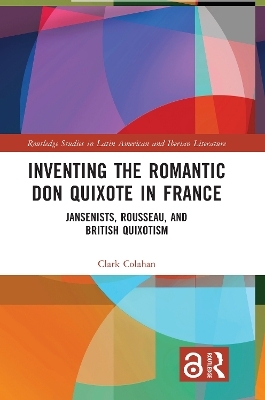
Inventing the Romantic Don Quixote in France
Routledge (Verlag)
978-1-032-46726-9 (ISBN)
- Lieferbar (Termin unbekannt)
- Versandkostenfrei innerhalb Deutschlands
- Auch auf Rechnung
- Verfügbarkeit in der Filiale vor Ort prüfen
- Artikel merken
Cervantes’ now mythical character of Don Quixote began as a far different figure than the altruistic righter of wrongs we know today. The transformation from mad highway robber to secular saint took place in the Romantic Era, but how and where it began has just begun to be understood. Germany and England played major roles, but, contrary to earlier literary historians, Pascal, Racine, Rousseau and the Jansenists scooped Henry and Sarah Fielding. Jansenism, a persecuted puritanical and intellectual movement linked to Pascal, identified itself with Don Quixote’s virtues, excused his vices, and wrote a game-changing sequel mediated by the transformative powers of a sorcerer from Commedia dell’Arte. As an early Romantic, Rousseau was attracted to the hero’s fertile imagination and tender love for Dulcinea, foregrounding the would-be knight’s quest in a play and his best-selling novel, Julie. Sarah Fielding reacted similarly, basing her utopian novel David Simple on the Jansenist concept of quixotic trust in others. Colahan here reproduces and explains for the first time the extremely rare original illustrations of the French sequel to Cervantes’ novel, and documents the fortunes in French culture of the magician at the heart of the Romantic Quixote.
Introduction of this book is freely available as a downloadable Open Access PDF at http://www.taylorfrancis.com under a Creative Commons [Attribution-Non Commercial-No Derivatives (CC-BY-NC-ND)] 4.0 license.
Clark Colahan is Anderson Professor of Humanities, Emeritus, at Whitman College, USA. He is the author of several books and numerous articles on Spanish and French literature of the Early Modern period and the Enlightenment. He is the author of The Visions of Sor María de Agreda: Writing Knowledge and Power, the co-editor of Spanish Humanism on the Verge of the Picaresque, and the co-author of the English translation of Cervantes’ last novel, The Trials of Persiles and Sigismunda.
Author’s foreword
Synopsis
Introduction
Chapter One: Hagiography and the religious side of Don Quixote’s parodic journey
Cervantes’ use of saints’ lives
St. Thomas of Villanueva
Traits and adventures of Don Quixote and Sancho running parallel to those of Brother Thomas.
Chapter Two: The Jansenist milieu
The Filleau brothers and Jansenism
Jansenist teachings
Filleau de la Chaise’s essay on Pascal’s Pensées
Chapter Three: Don Quixote’s rise toward moral exemplarity
A Jansenist tone
Protestant affinities
Dulcinea and faith
Chapter Four: Don Quixote as high moral achiever
Transforming Don Quixote and Sancho
Don Quixote doing good in the world, mostly
Pride goes before a fall
Chapter Five: Sancho as backsliding social climber
Toward the utopia of fraternity and equality
Increasing day by (every other) day in wisdom and strength
Chapter Six: Reason, trust, and which way lies happiness?
Reason
Parafaragaramus and confusing choices
Chapter Seven: Magicians in Commedia dell’Arte and the Quixote sequel
"The Fake Necromancer"
Practical jokers
"Mother Goose" and "The Barrel"
The magician as director of tragi-comedy
Chapter Eight: Rousseau’s recasting of Parafaragaramus
Trickery versus tenderness
Taking courage through trust
Justice versus sadism in society
Chapter Nine: Magician Overboard Downstream
Benevolent and effective
All-knowing denouncer of misdeeds
Active pursuer of delinquents
Thief of happiness
Stage magician
Object of Ridicule
Magician as dangerous scientist harming nature
Chapter Ten: The British Don Quixote: good-humored laughter and utopias
Sarah Fielding on selfless friendship and Henry Brooke on Don Quixote’s humanitarianism
The split English reaction to Don Quixote’s ‘Enthusiasm’
Rousseau’s impact
Coleridge and Don Quixote through the lens of German philosophy
Chapter Eleven: Rousseau’s Julie - reliving Don Quixote’s failed quest
Summary and Take-away
Works Cited
Index
| Erscheinungsdatum | 10.10.2024 |
|---|---|
| Reihe/Serie | Routledge Studies in Latin American and Iberian Literature |
| Zusatzinfo | 31 Halftones, black and white; 31 Illustrations, black and white |
| Verlagsort | London |
| Sprache | englisch |
| Maße | 152 x 229 mm |
| Themenwelt | Geisteswissenschaften ► Sprach- / Literaturwissenschaft ► Anglistik / Amerikanistik |
| Geisteswissenschaften ► Sprach- / Literaturwissenschaft ► Literaturgeschichte | |
| ISBN-10 | 1-032-46726-6 / 1032467266 |
| ISBN-13 | 978-1-032-46726-9 / 9781032467269 |
| Zustand | Neuware |
| Informationen gemäß Produktsicherheitsverordnung (GPSR) | |
| Haben Sie eine Frage zum Produkt? |
aus dem Bereich


